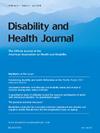脊髓损伤成人自我报告的阿片类药物和苯并二氮杂卓使用情况与健康相关生活质量的关系。
IF 3.7
2区 医学
Q1 HEALTH CARE SCIENCES & SERVICES
引用次数: 0
摘要
背景:对脊髓损伤(SCI)患者使用处方类阿片和苯二氮杂卓与健康相关生活质量(HRQOL)指数之间关系的了解有限:对脊髓损伤(SCI)患者使用处方类阿片和苯二氮杂卓与健康相关生活质量(HRQOL)指标之间的关系了解有限:目的:确定脊髓损伤成人中自我报告的处方阿片类药物和苯二氮卓类药物使用情况与两项健康相关生活质量(HRQOL)指标(过去30天中身体健康状况不佳的天数和精神健康状况不佳的天数)之间的关系:对居住在美国东南部的 918 名患有慢性(1 年以上)创伤性 SCI 的成年人进行了一项横断面队列研究。参与者完成了自我报告评估(SRA):在初步模型中,阿片类药物和苯二氮卓类药物的使用与过去一个月中身体健康状况不佳和精神健康状况不佳的天数增加有关。在对健康状况(疼痛强度、痉挛、焦虑和感知睡眠不足)进行控制后,使用阿片类药物与过去 30 天内身体健康状况不佳天数增加 2.04 天(CI = 0.69; 3.39)有关,使用苯二氮卓类药物与精神健康状况不佳天数增加 2.18 天(CI = 0.70; 3.64)有关。年龄与更多的身体健康状况不佳天数和更少的精神健康状况不佳天数有关。收入越低,精神健康状况越差。大多数健康状况与上个月身体和精神健康状况不良天数有明显关系:结论:即使控制了健康状况,阿片类药物和苯二氮杂卓类药物的使用仍与身体和精神的 HRQOL 差异有关。治疗策略应考虑药物干预可能带来的意想不到的负面影响。本文章由计算机程序翻译,如有差异,请以英文原文为准。
Relationships of self-reported opioid and benzodiazepine use with health-related quality of life among adults with spinal cord injury
Background
There is limited understanding of the relationships between prescription opioid and benzodiazepine use and indices of health-related quality of life (HRQOL) among those with spinal cord injuries (SCI).
Objective
To identify the relationships between self-reported prescription opioid and benzodiazepine use and two indicators of HRQOL, number of days in poor physical health and poor mental health in the past 30 days among adults with SCI.
Methods
A cross-sectional cohort study of 918 adults with chronic (>1 year), traumatic SCI living in the Southeastern United States was conducted. Participants completed a self-report assessment (SRA).
Results
In the preliminary model, both opioid and benzodiazepine use were associated with a greater number of days in poor physical health and poor mental health in the past month. After controlling for health conditions (pain intensity, spasticity, anxiety and perceived sleep insufficiency), opioid use was associated with 2.04 (CI = 0.69; 3.39) additional poor physical health days in the past 30 days, and benzodiazepine use was associated with 2.18 (CI = 0.70; 3.64) additional days of poor mental health. Age was associated with greater number of poor physical health days and fewer poor mental health days. Lower income was associated with poor mental health days. Most of the health conditions were significantly related to the number of past month poor physical and mental health days.
Conclusions
Opioid and benzodiazepine use are associated with poor physical and mental HRQOL, even after controlling for health conditions. Treatment strategies should consider potential unanticipated negative consequences of pharmacological interventions.
求助全文
通过发布文献求助,成功后即可免费获取论文全文。
去求助
来源期刊

Disability and Health Journal
HEALTH CARE SCIENCES & SERVICES-PUBLIC, ENVIRONMENTAL & OCCUPATIONAL HEALTH
CiteScore
7.50
自引率
6.70%
发文量
134
审稿时长
34 days
期刊介绍:
Disability and Health Journal is a scientific, scholarly, and multidisciplinary journal for reporting original contributions that advance knowledge in disability and health. Topics may be related to global health, quality of life, and specific health conditions as they relate to disability. Such contributions include:
• Reports of empirical research on the characteristics of persons with disabilities, environment, health outcomes, and determinants of health
• Reports of empirical research on the Systematic or other evidence-based reviews and tightly conceived theoretical interpretations of research literature
• Reports of empirical research on the Evaluative research on new interventions, technologies, and programs
• Reports of empirical research on the Reports on issues or policies affecting the health and/or quality of life for persons with disabilities, using a scientific base.
 求助内容:
求助内容: 应助结果提醒方式:
应助结果提醒方式:


